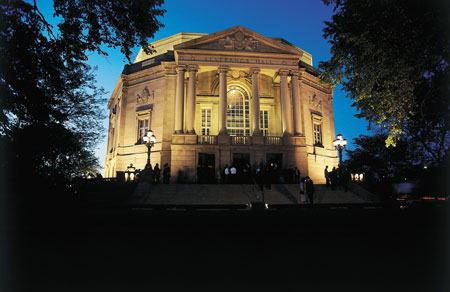
Croatian pianist Martina Filjak made an immediate impression with her carefully wrought crescendo and intensifying coloration of the famous opening chords and bass punctuation that begin Rach 2. Same conductor, same orchestra, but when the other hundred or so musicians on the stage joined Filjak in her musical odessey through this engaging score, it was clear that the soloist was seeing it through a different lens.
Her overview of the piece generally seemed to have more thrust and sweep than what we had heard on Friday in a differently excellent performance by Dmitri Levkovich. Filjak’s also had more overtly emotional qualities. She found opportunities for tiny surges and delicious moments of expression, shining little spotlights on details as she went along without distorting tempos or interrupting phrases. Jahja Ling took care to shush the fiddles from time to time, giving the piano a fighting chance of sounding through the wonderfully plummy string sound the Cleveland Orchestra adopted for the occasion. The brass completely obliterated Filjak’s efforts at a couple of points, but who really cared when the sound was that magnificent?
Filjak went molto rubato in her first movement interlude, giving herself lots of space, then, as if to recover lost time, set up a thrilling accelerando to the end. The Adagio seemed a bit more expressively pliable on Saturday. Filjak played her one-line melody with extreme grace and elegant hand and arm movements. She played with even more feeling as the tonality changed. Filjak pressed forward to neatly set up the scherzando, she made dramatic backward releases away from the keyboard, and then established a new, dreamy-surgey mood before making an exquisite valedictory statement.
The final Allegro Scherzando began with some rhythmic dissonance between piano and winds, and the brass punctuated the opening statement just a nanosecond late, but the rest of the concerto played out in a spacious, suspenseful and brilliant manner. After the final, triumphal playing of the big, singable (and, thanks to Hollywood, textable) tune, a gradual standing ovation ran like The Wave through the large audience, bolstered tonight by a large contingent attending the very successful black-tie benefit ‘Bravo Piano’.
Kudos to Korean pianist William Youn for halting the Rachmaninoff landslide by choosing Brahms’ first concerto (a decision made long before anyone knew what would be on the menu for the Final Four). We love Rachmaninoff, but it was a relief to have another composer happening to occupy the final slot. Maestro Ling set up the concerto with a spacious and highly profiled exposition of the craggy, opening statement. Youn had to sit awhile before adding his voice to the texture, but when he did, his touch was assured and brilliant and he was completely in possession of the difficult notes he had to play. Youn seemed a little impatient with the pace Ling had established, pressing a bit to the end of phrases, and eventually articulating the main theme on its return in a slightly different way than we had heard it before. His tendency toward dramatic releases at the end of phrases sometimes produces unintended accents.
In the gorgeous Adagio, Youn expressively stretched the tempo and played with rich, strong chords over the long pedal point. In the Rondo, he established a well-articulated and attractively accented theme and proceeded to explore the playful side of his keyboard personality. The cadenza was dramatic, with punched-up notes ringing brilliantly out of the texture, and Youn, Ling and the Orchestra brought Brahms thrillingly home to an immediate standing ovation and volleys of ‘Bravos’. Another exceptional evening at Severance Hall.
[Editorial note: Owing to the chronology of the evening, in which the winners were to be announced shortly after the second performance, of course we wrote this report after we knew the results, but we’ve tried to forget that and stick strictly to the notes we made during the concert].
It took only about half an hour before executive director Karen Knowlton was able to announce the four winners. The Jury was back within twenty minutes, but it took a while to round up the finalists, who seemed to be lost somewhere in the madding crowd. Eventually all were gathered on stage and Knowlton suspensefully ran through the list in reverse order. Fourth place went to Russian contestant Evgeny Brakhman, third place to William Youn, second place to Canadian Dmitri Levkovich, and top prize to Martina Filjak.
Though the decision might have been surprising to some who heard only the final concertos or to those who were keeping an eye on the applause meter, we’ll bet that the judges took the entire series of rounds into consideration in arriving at their ranking. ‘Brava!’ to Martina, and ‘Bravos!’ to Dmitri, William and Evgeny, for so many pieces so well played in the last two weeks. There are more prizes to come on Sunday afternoon.
Photo above: Roger Mastroianni


